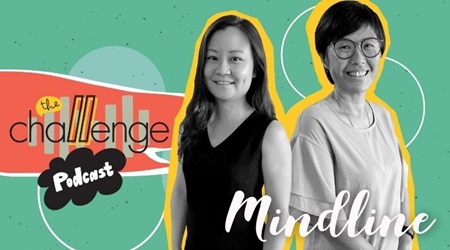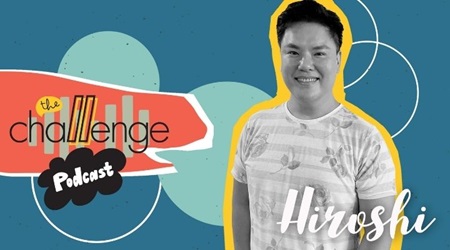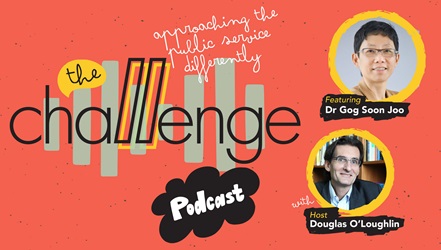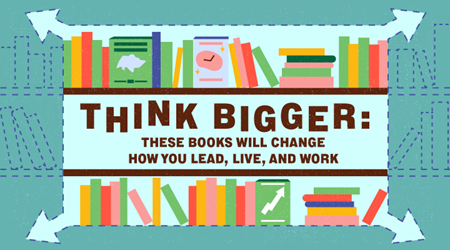Centring Yourself Through Mindfulness
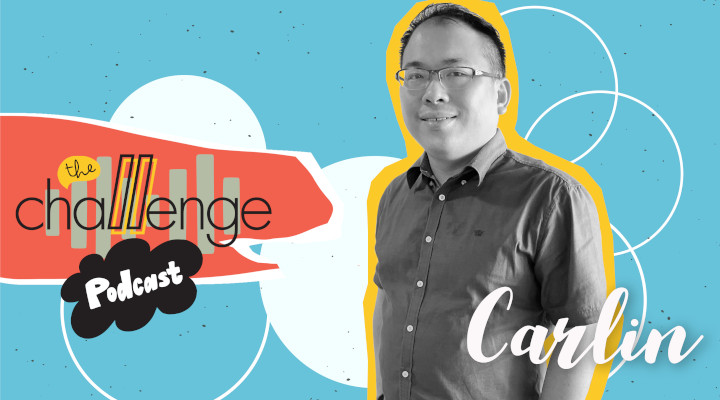
Did you know you could decompress from a stressful day by practising mindfulness for as little as one minute? We find out how and what its benefits are. Transcripts have been edited for clarity and language.
Transcript
Host: Douglas O’Loughlin
Audio: Fei
Douglas: Hello and welcome to the Challenge Podcast where we discuss all things Public Service in Singapore. I'm your host, Douglas O'Loughlin, an organisation development consultant and a former public officer.
Today we are happy to have with us educator and counsellor, Carlin Lee, who is with Ngee Ann Polytechnic. He is also a mindfulness practitioner. Welcome to the show, Carlin.
Carlin: Hi, Douglas. Thanks for inviting me.
Douglas: For our listeners who are not familiar, can you help us understand what a student counsellor does, particularly at Ngee Ann?
Carlin: So other than one-to-one counselling, we are involved in initiatives that support student mental health, such as a peer helper club and a mental health curriculum.
Douglas: And I understand that at Ngee Ann Poly at least, most or all lecturers get some training on how to do counselling work with students?
Carlin: Yes, all academic staff are trained in basic counselling skills. And from there, we hope to equip them with intermediate counselling skills and also train those interested to be para-counsellors.
Douglas: That really sounds like a wonderful skill for all teachers in the world to have, to at least be that first responder, I guess. And if it's more serious, they can pass it on to the professionals. It’s a great idea.
You oversee the polytechnic’s mental health support ecosystem. What does that entail?
Carlin: So other than programmes for students, I oversee initiatives for staff, including the engagement of para-counsellors, who are lecturers trained with more counselling skills, and other training programmes for staff. I also work with internal and external stakeholders to enhance mental wellness in my organisation.
Douglas: That seems like a lot. Do you feel it has led to a lot of progress in the school?
Carlin: Yes, I believe we have a pretty good system. It is a very good overarching system that takes care of students from all areas: be it their peers, lecturers, the para-counsellors or the counsellors.
Douglas: That's great. And I love that there is a whole ecosystem, not just looking at it from individual angles. You also have a really interesting and wide range of experience in the field of psychology: performance psychology, for example, and you have worked with nurses, police officers in a lot of different high-intensity situations. Can you tell us more about how you got into that?
Carlin: After I finished my undergraduate studies in psychology, I went on to do a postgraduate degree in performance psychology in Australia. I wanted to focus on the psychological aspects of supporting students or athletes. Both are my areas of interest and eventually I was accepted into the programme. It covered a range of topics, including professional psychological practice, mental health and intervention methods to enhance people’s performance.
Douglas: And this applies to people in healthcare, the police and even students who need to be sharp in what can be quite intense circumstances?
Carlin: Yes, because when we think about performance, we often think about athletes and people who need to perform. But we also need to understand that people need to perform on a daily basis, including nurses who work in the ER, or police officers, firefighters, you know, people who need to perform in very critical situations. And this also includes students who study for long periods of time and have that one examination to prove themselves, like the GCE ‘O’ Levels. That's almost like the Olympics where you prepare for a once-every-four-years event.
Douglas: Yes, it really is a good way to look at it. Carlin, we know that you are a mindfulness practitioner as well. I am just wondering if you could define mindfulness for us, especially since there are some misperceptions about it. Could you give us some clarity on what mindfulness is all about?
Carlin: A lot of people think mindfulness may be sitting somewhere, meditating and not moving for half an hour or an hour. Mindfulness is part of meditation. Mindfulness is the ability to be fully present, to be aware of where we are, and what we're doing, sensing and feeling at the present moment. This is a typical definition from most mindfulness resources, and being mindful will require one to intentionally pay attention to the present moment. And notice the sights and sounds, your thoughts, your emotions, your physical behaviour, your physiology, and keeping a non-judgmental stance towards what is being observed in the body and what's around you.
Douglas: Okay. I have heard it is actually not that hard to be mindful, but it is hard to remember to be mindful. I don't know if that's fair.
Carlin: Yes, it is a pretty intentional practice, as we say it.
Douglas: Yes. So anytime, all day, we can choose to be mindful.
Carlin: Even taking a walk through the park could be a moment for mindfulness as well.
Douglas: For those who are still thinking about it, could you share some of the benefits, whether it is at work, school or personal life?
Carlin: Some of the benefits include being more aware of your current thoughts and feelings and having more control over them. You feel more relaxed, less stressed, and you increase your attention span and might feel happier as well. For work and studying, the increased awareness of thoughts and control of these emotions, especially during stressful situations, will definitely lead to an increase in performance. And in your personal life, mindfulness may lead to better communication and relationships with people due to the clearer thought processes and understanding of your own emotions.
Douglas: Nice. How and where is a good place to start?
Carlin: A good start would be to practise deep breathing exercises. So through purposeful, deep breathing, and paying attention to each breath, you can start to calm yourself down, and gain awareness of your emotions and how you're feeling at the moment. The deep breathing technique that I normally teach is the four-two-eight technique where it is four seconds of breathing in through the nose, holding it for two seconds, followed by eight seconds of slow breathing out through the mouth. Some of the benefits my students and clients derived from this included being calmer, reduced negative thoughts and feeling more relaxed. Even if they do this for a few minutes.
Douglas: COVID-19 has brought about a whole new way of seeing things for a lot of people. People are reassessing their priorities in life and thinking about what truly matters. So speaking of being mindful, how can people be more mindful of that, let's call it a sweet spot between, you know, what we need to do, what we want to do to get things done, and also taking care of ourselves?
Carlin: Firstly, we really need to have breaks to practise mindfulness. It could be just a minute or two, as you drink a cup of water or go for a shower. It is really just to feel that sense of relaxation as you move from one activity to the next.
With COVID-19, many of us are working from home at the moment. It is quite unavoidable that work and personal life become inseparable. And some may actually be working longer hours. In my opinion, I believe it's a question of building work-life boundaries, where you intentionally draw a line between where and when you work, and where and when you spend time for yourself.
Organisations and managers could probably start the practice of boundaries with their staff, such as reducing communication and WhatsApp messages after working hours. This would guide staff to practise the boundaries for themselves as well. We definitely need this distinction to focus on ourselves, our family and our own mental health. I think it is truly a choice that we make for ourselves.
Douglas: Some people I have spoken to say what they really missed in moving to a work-from-home arrangement is the commute where they could disengage from work and re-engage with their family at home. And of course, vice versa. So they tried to create habits at home, because now there's no more commute. I even know a few people who dress up for work from home, and then put on shorts and a singlet after, you know, to set up boundaries, so to speak, which is quite a cool idea.
COVID-19 has meanwhile seemed to have really brought mental health to the forefront for the whole country. But the term itself – mental health – has a bit of a stigma to it.
Carlin: I believe we need to build more awareness and understanding before we can truly reach a stage of acceptance. For those with mental health issues, there are currently many initiatives and groups that are working to increase awareness of mental health. In Singapore, however, there are still many people who do not really understand mental health. So without an understanding of these issues, it might be difficult to reach a state of acceptance.
And to actually fight the stigma, I believe we need to educate people about the distinction of these two terms: mental health and mental health conditions also known as mental illnesses. Both of them have the word “mental”, but they are two totally different concepts. So mental health, like our physical health, asks the question of are you healthy, with the answer falling within the spectrum of feeling healthy and not feeling healthy. So from the aspect of physical health, you may be obese and unfit, but you may not be sick or ill.
Similarly, you may be practicing unhealthy mental health habits or indulging in unhealthy coping methods such as not sleeping enough or stress eating. But you may not have a mental health condition or mental illness. I believe the stigma arises from a lot of people lumping the two together and believing there is always a connection between having poor mental health and therefore having a mental illness.
Douglas: I think that's a good distinction. I think we really need to get rid of the stigma that mental health is a bad word to talk about. At the same time, people need to have a friend they can talk to. At the Civil Service College, I had two colleagues I could reach out to when I had a rough time. It means a lot to just reach out to somebody and have a conversation with someone who listens.
But what about people struggling with mental health issues and the attempt to make that distinction, what sort of steps can they take?
Carlin: If you have a diagnosed mental health condition, or you suspect that you may have a mental health condition, I would definitely recommend that you seek help from a professional. Don't delay treatment, hoping that all these issues will go away with time. The professional will teach you techniques to deal with the symptoms and recover from the condition with time. And definitely, like we mentioned earlier, it is different for those with unhealthy mental health habits.
And you might find yourself practising these habits to deal with the stress. Probably something that you could do is pay attention to the stress levels, and understand where the triggers are, or what triggers you to be stressed. And from there, you can choose to move away from the triggers, or choose better coping methods. I definitely would recommend that you focus on social support, and connect with people you are very close to such as friends and family.
Douglas: It comes back to mindfulness in some way and to have self-awareness of what's happening. I suppose the team you are a part of, and probably all counsellors and psychologists in the country are pretty overwhelmed since the pandemic broke out. How do you manage?
Carlin: One thing we do is to often have conversations with our peers at work to understand each other and our stresses, so that the managers know what's happening among the staff. And we are able to accommodate, support and provide mental and social support for each other as well as a group.
And I guess that helps to increase our performance with time. And it's not a matter of getting work done, but a matter of making sure everybody is well. Because if we are okay, we would be able to do the things that we hope to do. I know everybody hasn't been on a plane for a long time, but this is the example I would give: remember what the flight attendant would say? If you have a child with you, always put on your mask before you help your child, right? We say something similar: take care of yourself so you would be able to take care of people around you.
Douglas: You know, I used to think that was a bit of a bluff or just a nice story to tell. But I read that that's really true. Because by the time you start to put it on your kid there is a high chance that you could pass out. So yes, I'm totally with you. I think that's a lesson for all of us really, the power of just talking it out with a good listener. How much of your team’s social support is structured time? Or is it impromptu?
Carlin: Usually it's impromptu and it really depends on who is in the office. Currently we cannot really have face-to-face sessions. We do have online sessions and we do it via text messaging as well. It is the best that we have at the moment.
Douglas: When you think of the whole landscape for mental health or wellbeing in Singapore, what do you think is missing? What are your aspirations for the future, for us as a country, in this area?
Carlin: I think we need to view mental health of Singaporeans from several levels: personal, organisational and national. On the personal level, we need to learn to take care of ourselves, be mindful from time to time, be able to identify healthy coping methods to help ourselves such that we can therefore take care of our families as well.
Where the organisation is concerned, we need to acknowledge that our staff need time and space to take care of their mental health. Managers could check in with staff from time to time and remind them of these work-life boundaries.
Employers also need to understand that with good mental health, our staff would definitely work more productively and be happier. And that is, I would say, the key ingredient for longevity in your career, or people staying in your organisation.
On a national level, hopefully we could have more funding for the different sectors, such that we can actually increase headcount and manage the workload within each of these organisations. We could also have more effective mental health initiatives such that we can reduce stress for staff, for the organisation, and for individuals. All this would be in the hope of creating a culture of mental wellness and care for everybody in Singapore.
Douglas: Well, that's a beautiful aspiration. Do you have any last words of advice or reminders for our listeners?
Carlin: I think, a great reminder is definitely to take care of ourselves, to sleep well, eat well, especially in this period of stress from COVID-19. Taking good care of ourselves and having a proper routine would reduce a lot of stress. And make sure you have good connections with those whom you love as well.
Douglas: Most of those things are little things we can do on a day-to-day basis. Is that fair to say?
Carlin: Yes, definitely. They are small but definitely very important things that we neglect as we become more and more busy and stressed.
Douglas: All right, that's a nice way to finish. Thank you so much Carlin for being part of the show. And all the best to you and the team back at Ngee Ann.
Carlin: Thanks, Douglas.
Douglas: Thank you for listening to this podcast. I’m your host Douglas O’Loughlin. Follow us for new episodes, and follow psd.gov.sg/challenge for more public service stories.

To hear more conversations like this, follow the Challenge Podcast on Spotify.
- POSTED ON
Dec 2, 2021
- TEXT BY
Keval Singh
-
Season 2: Mental Wellbeing
Employee Wellbeing And Self-Care
-
Season 2: Mental Wellbeing
Mindline.SG and the Road To De-stigmatising Mental Health Issues
-
Season 2: Mental Wellbeing
The Case for Employee Wellbeing





